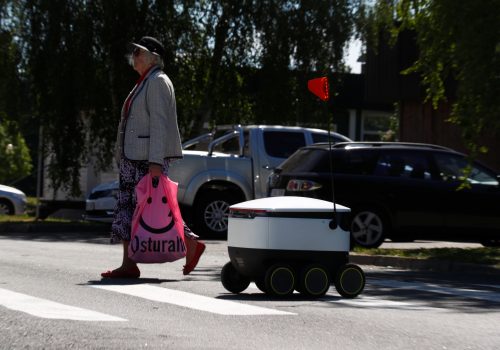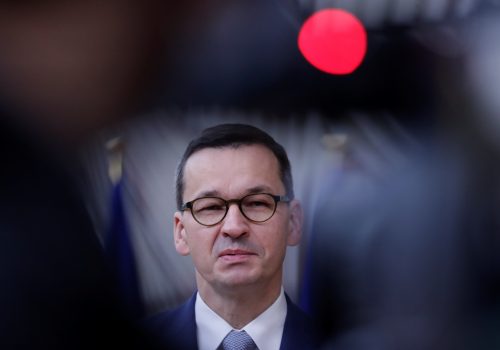Policy memo: A digital agenda for the Three Seas Initiative Summit
SUMMARY
Leaders at the Three Seas Initiative (3SI) Summit and Business Forum in Sofia, Bulgaria, on July 8-9, 2021, should double down on the Initiative’s digital pillar by agreeing to a set of tangible measures, as part of a greater regional digital transformation strategy, to (1) build a supportive ecosystem for emerging technologies; (2) develop regional digital infrastructure; (3) identify shared resources to invest in digitalization; (4) and amplify the region’s voice on digital policy matters in the European Union (EU) and the transatlantic relationship. Specifically, they should:
- Map existing hubs and clusters of digital specializations
- Establish a virtual cybersecurity center with a training academy and joint cybersecurity standards
- Launch a public-sector digitalization initiative
- Create a 3SI Digital Ministers Council
- Establish a depository for comparative “lessons learned”
- Identify and invest more in digital projects, ensuring that cross-border projects are on the 3SI agenda
- Assume a proactive role in the debate over EU digital priorities, including working to enhance US engagement with the digital elements of 3SI
WHY THE SOFIA SUMMIT SHOULD ACT ON DIGITALIZATION
Central and Eastern European (CEE) countries are showing signs of a strong recovery from the economic shock of the pandemic. However, there will be no “return to normal.” This moment of disruption presents an opportunity. 3SI leaders should send a signal at the Sofia Summit to their citizens, companies, and investors that they are seizing the transformational potential of digitalization in the wake of the COVID-19 health and economic crises.
Digitalization has the potential to become the engine behind a new cycle of growth in CEE. It can help CEE countries address structural challenges to their existing export and low-wage labor reliant model and turn the region into a next-generation technology leader.
The digital economy presents significant opportunities. Digitalization can serve as an economic multiplier by creating efficiencies in non-digital sectors. Institutionalizing interoperable digital solutions to cross-border commerce will allow the region to increase its economic efficiency and long-term competitiveness.
But structural challenges are harming that economic potential. Labor shortages, wage and inflation pressures, and lagging home-grown innovation remain key problems that hamper economic—and digital—development. Data show the region needs to catch up. The workforce lacks essential digital skills, and CEE companies lag behind those in other European countries in integrating digital solutions. The 3SI Summit is an opportunity to address these structural issues and promote regional approaches.
The COVID-19 pandemic has also accelerated the need for shared digital infrastructure. During the pandemic, CEE consumers relied on digital solutions. According to a McKinsey report, e-banking saw a 21 percent increase, online grocery orders rose by 18 percent, and online government service use was up 13 percent. Finally, as recent cyberattacks on critical infrastructure have shown, all digital infrastructure requires effective defenses. Gas pipelines and hospitals have fallen victim to cyberattacks from both state and non-state actors. As the region continues to develop its infrastructure, all projects will require advanced cybersecurity protections to deter such attacks.
THREE SEAS INITIATIVE AND THE DIGITAL PILLAR
To date, 3SI digital efforts have suffered from a lack of regional cooperation and limited access to capital relative to the other pillars. The establishment of the Three Seas Investment Fund is a welcome step to provide financial resources for more than seventy priority projects. However, only 17 percent of those projects are digital, even though the Fund has estimated the digital pillar will require the most capital investment.
Digital infrastructure development is also qualitatively different from the Three Seas’ energy and transport pillars. An effective digital agenda will require not only investment in digital infrastructure projects but will also need coherent policy support to build an ecosystem for digitalization and innovation.
To be fair, previous 3SI summits have seen commendable progress on digital development. The 2020 Tallinn Summit included a proposal for Smart Connectivity, calling for the application of a digital layer on all energy and transportation connections across the region. The Smart Connectivity plan is a step in the right direction, but an effective 3SI digital pillar requires an increased focus on shared projects and a larger vision to create coordinated policies that will facilitate private investment in innovative technologies.
RECOMMENDATIONS
Leaders should agree to put in place concrete measures to upgrade the Initiative’s digital pillar, which can serve as the foundations of a long-term 3SI digital agenda. The following recommendations should guide policymakers’ actions at the upcoming summit.
Build a supportive ecosystem for emerging technologies
- Map existing hubs and clusters: Task a working group to capture 3SI countries’ national digital priorities, existing capacities, and clusters in key technologies. Doing so will allow natural coalitions of the willing to partner on specific cross-border digital projects. This will allow states to pool limited resources and share expertise on existing digital projects.
- Establish a Three Seas Cybersecurity Center: Proposed by an Atlantic Council Cyber Statecraft Initiative report, such a center would convene government, private-sector, and civil-society actors from across the 3SI to protect critical regional infrastructure and 3SI investments, coordinate national response teams, and work with international partners. The center should also include a virtual training academy to build trust, best practices, and information-sharing while developing a curriculum and training modules on cyber workforce skills. Over time, such a center should advance joint cybersecurity standards, protocols, and certifications and specifically identify cybersecurity requirements for all infrastructure projects in which the 3SI Investment Fund invests.
- Launch a 3SI Digital Public Services Initiative: Governments should cooperate to identify and address the best opportunities for using digitalization to reduce barriers to trade and investment. This can involve digitized customs processes, e-procurement, or invoicing. Breakthroughs on even one form of digital public services would serve as a demonstration of CEE governments’ commitment to succeeding in the digital world and will have spillover effects for the private sector.
Build the infrastructure for 3SI cooperation on digitalization
- Create a 3SI Digital Ministers Council: Organize a ministerial-level council for the relevant minister of each 3SI country to meet his or her counterparts twice a year to share updates and identify deliverables on cross-border digital policy initiatives. This group should issue a report before every summit on the 3SI’s digital progress, and what areas still need to be addressed. The grouping could also share positions and approaches to key EU or transatlantic digital initiatives.
- Establish a repository for sharing “lessons learned”: Set up a task force to identify the best way to share digital policy experiences and initiatives among the CEE governments, so that each can learn from the other. By providing case studies, rosters of experienced practitioners/experts, and other resources, such a repository could accelerate adoption of digitalization across the region.
Find the resources to invest in digital
- Identify and invest in more digital projects: Digital investments remain the smallest share of the Three Seas Investment Fund’s priority projects. Policymakers at the summit should commit to a greater focus on digital investments, both in the form of tangible projects such as high-speed fiber-optic cables, and other efforts that recognize the view of digital infrastructure to include trainings, education, and supporting digital literacy.
- Ensure cross-border digital investments are on the table: Three Seas leaders should agree to utilize 20 percent of EU COVID-19 recovery funds earmarked for digital transformation to cross-border projects. The clusters could pool their funds to invest in any digital projects they identify instead of national projects.
Become advocates for digital in the EU and the transatlantic space
- Assume a proactive role in the debate over the EU’s digital priorities: The formation of the EU-US Trade and Technology Council presents 3SI countries with another opportunity to advocate for a CEE voice and ensure that CEE priorities are taken into consideration in determining the EU’s digital future. 3SI countries can advocate beyond just getting EU funding and take a shared approach in the EU on demanding prioritization of CEE digital projects.
- Create a roadmap for US engagement with the Three Seas: Develop a strategy to engage the transatlantic space for 3SI investment, especially in the digital space. Stress the importance of digital infrastructure to counter growing Chinese influence in the region, as well as the planet-friendly nature of digital infrastructure.
Frances G. Burwell is a distinguished fellow at the Atlantic Council and a senior director at McLarty Associates.
Jörn Fleck is deputy director at the Atlantic Council’s Europe Center.
James Batchik is a program assistant at the Atlantic Council’s Europe Center.
Luka Ignac is a young global professional at the Atlantic Council’s Europe Center.
Further reading
Image: Romanian President Klaus Iohannis and European Commission President Jean-Claude Juncker attend the Three Seas Initiative Summit in Bucharest, Romania, on September 18, 2018. Inquam Photos/Octav Ganea via Reuters.


